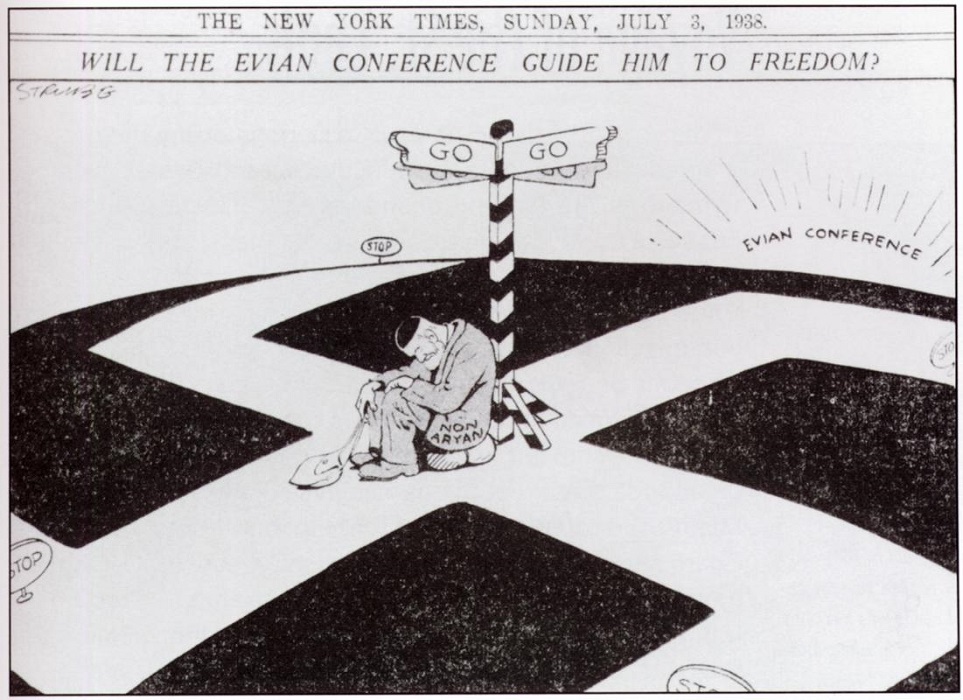![]()
Friday, January 20, 2017 | by Salim Mansur
Originally published by Gatestone Institute. Republished with permission.

An editorial cartoon as published in the New York Times on July 3rd, 1938 ahead of the Evian Conference which was convened 6–15 July 1938, at Évian-les-Bains, France to discuss the Jewish refugee problem and the plight of the increasing numbers of Jewish refugees fleeing persecution by Nazi Germany.
UN Security Council Resolution 2334, adopted as a result of the United States abstention, on the instructions of outgoing President Barack Obama, confirmed the historic bigotry against Jews and Israel entrenched within the United Nations, just as it was within its predecessor, the League of Nations. As previously indicated, Arab and Muslim states could not move a single anti-Israel resolution in the Security Council without the complicity of the Western powers, representing the historically Christian nations.
The collusion of the Western powers and the Islamic countries against Jews and Israel is now ostentatious, without any subterfuge. Resolution 2334 was as sickening a surrender to the Arab-Muslim jihad in the name of “peace,” as was the surrender of UK Prime Minister Neville Chamberlain to the Adolf Hitler at Munich in September 1938.
The gathering in Paris on January 15, at the invitation of French President François Hollande, was further evidence of appeasing the Arab-Muslim world’s jihad against Israel.
The timing of the Paris gathering — five days short of the 75th anniversary of the notorious Wannsee Conference of 20 January 1942, held in the suburbs of Berlin, in which top-ranking Nazi officials finalized the preparation for the “Final solution to the Jewish problem” in Europe — could not have been more overtly insulting to Israel. Members of the European Union plotted shafting the Jewish state in accordance with the wishes of their Arab and Muslim friends of the Organization of Islamic Cooperation (OIC) — 56 Muslim states, plus “Palestine,” and the biggest bloc at the UN.
“Fake news” and writing “fake” history have long been the modus operandi of tyrants; nothing new. The “big lie,” repeatedly broadcast so that people might succumb to believing it, was an art that Joseph Goebbels, Hitler’s minister for propaganda, practiced to devastating results. The most notorious Arab ally of Hitler, the Grand Mufti of Jerusalem, Haj Mohammed Amin al-Husseini, as an admiring student of Goebbels, passed on the art of “fake” history and “big lie” to his allies.
It is grotesque and criminal that the EU and the UN, together in “ganging up,” insist that Israel comply with their resolutions — Israeli withdrawal to pre-June 1967 boundaries — without having shown any attempt to have the “Palestinians” of the so-called “occupied territories” end their jihadi terrorism.
It was not an oversight in the Security Council Resolution 242 of November 22, 1967 that there was no mention of “Palestinian” people, or “Palestinian Arabs,” or “Palestinians.”
In the decades after the passage of Res. 242, there was a systematic push by the OIC states in the UN, supported by the EU and its predecessor, the European Community (EC), to refer to disputed territories taken by Israel in a defensive war initiated by Egypt, Syria, and Jordan as “occupied” territories. The Egyptians had closed the Strait of Tiran at the mouth of the Red Sea, an act that was a casus belli, legal cause for war.
The UN, before 1967, did not refer to the West Bank and Gaza as “occupied” territories when they were “occupied” by Egypt and Jordan after the 1948-49 war, which the Arab states launched against Israel. The Arab states then were the “occupiers” of parts of Palestine west of Jordan until 1967, and rejected any notion of Jews having a historic connection with Palestine, which they claimed was an integral part of Arab lands.
The entire jihad of Mufti Haj Amin el-Husseini, and since, is based on the argument that Jews have no historic rights.
From the Arab perspective of religion and politics, there never was a “Palestinian” people, or nation, distinct and separate from Arabs as a people or nation. The jihad called by Husseini against Jews in Palestine after 1921 was in the name of “Arabs” and Islam, and it has so remained since. According to the Hamas charter, “the land of Palestine is an Islamic Waqf [Trust] upon all Muslim generations till the day of Resurrection” (Article 11).
Hence, that there ever had been a “Palestinian people” was a “big lie,” pushed by Arab states after 1967, and that the Western nations unquestioningly swallowed.
“Palaestina” — in a still earlier effort to strip the area of its Jewish roots, this time by the ancient Romans — was the name the Emperor Hadrian gave to territory on both sides of the River Jordan — Judea and Samaria — after crushing the Jews in the Bar Kokhba Rebellion in 135 CE.
Jerusalem, its principal city, was built by King David, a Jew, some ten centuries earlier.
In the seventh century CE, Arabs seized “Palestine” from the Christian Byzantine Empire and it became part of the Arab, later Ottoman Empire.
The Crusaders conquered Jerusalem in 1099 during the First Crusade, and subsequently the surrounding area, to establish the Kingdom of Jerusalem in the twelfth century. Arab armies evicted the Crusaders from Palestine at the end of the thirteenth century. For the next six centuries, in the name of Islam Arabs, then Turks under the Ottoman Empire, ruled over Palestine until 1917, when the British Expeditionary Forces arrived during World War I.
The defeat of the Ottoman Empire left its former Arab territories between Egypt and the Persian Gulf, including Palestine, under the control of the victorious Allied Powers, Britain and France. In the Balfour Declaration of 2 November 1917, the British government committed itself to “the establishment in Palestine of a national home for the Jewish people,” while noting that this should not “prejudice the civil and religious rights of existing non-Jewish communities” therein.
At the San Remo Conference of April 1920, the Allied Powers agreed that Britain, under the authority of the League of Nations, would be the Mandatory Power over Palestine. The League officially handed the Mandate for Palestine to Britain as a trust in London on 24 July 1922.
The Balfour Declaration was incorporated into the Palestine Mandate; the twenty-eight articles of the Mandate stipulated how Palestine would be governed until, as everyone understood, the Jews were capable of “reconstituting their [Jewish] national home” — meaning the establishment of a Jewish state in Palestine. There was no mention of a “Palestinian” people in the Balfour Declaration or in the Palestine Mandate, since speaking about Palestine primarily meant everyone there. Everyone born there at the time — Jews, Muslims and Christians — were Palestinians; that was what was stamped on everyone’s passport.
From the time of the Balfour Declaration and the League’s Mandate for Palestine until the UN Resolution 181 (1947), reference to “Palestine” meant land with a historic connection to the Jewish people. It was on this basis that the Jews’ (Zionist) claim to reconstitute their national home was given legal recognition by the League, which the UN, as its successor, was legally bound to protect.
Britain’s record as the Mandatory Power in Palestine between the two world wars was nothing short of shameful. British administrators of the Colonial Office, sent to Palestine, devised policies limiting Jewish immigration and favoring Arabs, as the first of a series of decisions that undermined the primary objective solemnly pledged in the Balfour Declaration and incorporated into the Mandate.
The subversion began with Sir Herbert Samuel, an English Jew, appointed the High Commissioner for Palestine in 1920, after the San Remo Conference. As the author William B. Ziff, documents in The Rape of Palestine — published in 1938 to the consternation of the British — Britain’s “stiffing” of Jews under the specious policy of treating the demands of both Jews and Arabs “equally” was in effect deliberately prejudicial against Jews.
The British historian of the Middle East, Elie Kedourie, born in Baghdad, Iraq, also documented in The Chatham House Version (1970), how Samuel’s policy, designed to conciliate Arabs, increasingly hurt Jews. Similarly, Pierre Van Paassen, a Dutch-American Unitarian minister, documented in The Forgotten Ally, (1943), the “stiffing” of Jews in Europe by the Western nations, and especially Britain as the Mandatory power in Palestine.
Britain’s perfidy over Palestine took root with the election in 1921 of a known felon, Haj Mohammed Amin al-Husseini, a younger brother of the deceased Mufti (religious head) and known to be a rabble-rouser, as the Grand Mufti of Jerusalem.
Husseini, despite the notoriety surrounding him, was the preferred candidate of Samuel for the position. The Grand Mufti, when World War II began, enthusiastically embraced the Third Reich, Hitler and his “Final Solution” for the Jews, and found his way to Nazi Berlin.
The poisonousness of Samuel’s choice of Amin al-Husseini as the Grand Mufti of Jerusalem, however, was exceeded by his role in creating the Emirate of Transjordan (present-day Kingdom of Jordan) at the expense of the Palestine Mandate. This was done at the behest of the Colonial Office under Winston Churchill, reputedly the most ardent English friend and supporter of Zionists, to appease Arabs.
In 1922, the chunk of Palestine east of the River Jordan, amounting to about two-thirds of the Mandated territory, was sliced off and gifted to Abdullah, son of Sharif Hussein of Hejaz, under whose name the flag of the 1916 “Arab Revolt” against Ottoman rule was raised.
After the 1922 partition of Palestine, which gave most of the land promised to the Jews to Transjordan, the substantially reduced Mandated territory remained only west of the River Jordan. Transjordan, as an Arab state, became closed to Jewish immigration.
Consequently, the policy of allowing Jewish immigration, according to the formula of “absorptive capacity” adopted during Samuel’s tenure in Palestine, turned increasingly restrictive. Arab opposition, with incitement to violence against Jews by the Mufti and his supporters, escalated, and Britain’s appeasement of the Arabs became routine.
The sordid legacy of Britain, as the Mandatory authority in Palestine, was the restriction of Jewish immigration from Europe when it turned out to be most urgently needed. As the desperation of European Jewry mounted after Hitler came to power in Germany in 1933, the response of the Western powers was completely to deny entrance to Jewish refugees who had started fleeing the Nazis.
Finally, a meeting of the Western nations to consider the Jewish plight was called at the initiative of U.S. President Franklin Roosevelt. Thirty-eight countries attended this meeting in July 1938, known as the Evian Conference, held in France.
The Evian Conference was doomed even before it convened. Among the countries attending, not one — not even Canada, Argentina or Australia, with vast open spaces — was prepared to accept Jewish refugees from Austria and Germany. Even worse, the United States and Britain refused to open their doors to Jewish refugees from Hitler, while at the same time Britain also prohibited Jews from entering Palestine.
The Evian Conference was the last gasp of Western powers to lend assistance to a people threatened with extinction by their enemies. The spectacle of the Evian Conference as a charade, according to the historian Robert Wistrich, could only have firmed the resolve of Hitler to proceed with his plans for the “Final Solution.” In his book, Hitler and the Holocaust, Wistrich wrote:
“If Nazi Germany could no longer expect to export, sell, or expel its Jews to an indifferent world that plainly did not want them, then perhaps they would have to do something even more drastic.”
After the defeat of the Nazis, and after their crimes against Jews were no longer disputed or hidden, the Western powers, through the UN, could have established Israel, as justice demanded, in what was left of the Palestine Mandate on the entire territory west of the River Jordan.
But the subsequent history of Palestine, approached by the Western powers with a second partition under the UN resolution of November 1947, turned out predictably as sordid as that of the Mandate under Britain’s supervision during the period 1922-48.
The Arab states, in failing to achieve their objective of defeating Israel during the 1948-67 period, adopted the unconventional means of jihadi terrorism backed by the repeated broadcast of the “big lie” that the Western nations, or Christendom, willfully accepted. The “big lie” is that the “Palestinians,” as a people under a supposed “occupation” by Israel — to which the Arabs had agreed in the Oslo II Accord (section: Land) — deserve a state of their own.
The state for the “Palestinian” people (Muslims and Christians) in two-thirds of Palestine was created arbitrarily by Britain in creating Transjordan in 1922. The “two-state” solution in Palestine therefore has been in existence for the past ninety-five years.
For the past nine decades and more, however, Arabs and Muslims, with 56 Muslim states in the OIC, have been waging jihad to destroy the one and only state of the Jews. And Christendom, as if oblivious of its own shameful past history of anti-Semitism, has even more shamefully supported the falsification of history. The first time it was done by UNESCO, in calling ancient Biblical sites (including Jerusalem) Islamic, when Islam did not even exist at the time.
Now, with UN Security Council Resolution 2334, the UN, with the enthusiastic manipulations of U.S. President Barack Obama and the backing of most European leaders, is complicit in this jihad against Israel.
Salim Mansur is a Distinguished Senior Fellow at the Gatestone Institute. He teaches in the department of political science at Western University in London, Ontario. He is the author of “Islam’s Predicament: Perspectives of a Dissident Muslim” and “Delectable Lie: A Liberal Repudiation of Multiculturalism.”



 RSS
RSS










Latest Comments
Hello Mike, Thank you for your positive feedback to the article. I felt there wasn’t too much critical analysis of ...
Thanks for this considered and well constructed article. A follow up article on the manner in which the editorial contro...
THE CLUELESSNESS OF CLAIMING THAT OBAMA'S MIDDLE EAST POLICIES WERE A FAILURE CANNOT BE FURTHER FROM THE TRUTH, WHAT THE...
As long as Obama is the president of the usa do not trust the us government......
Thank you for an good read....